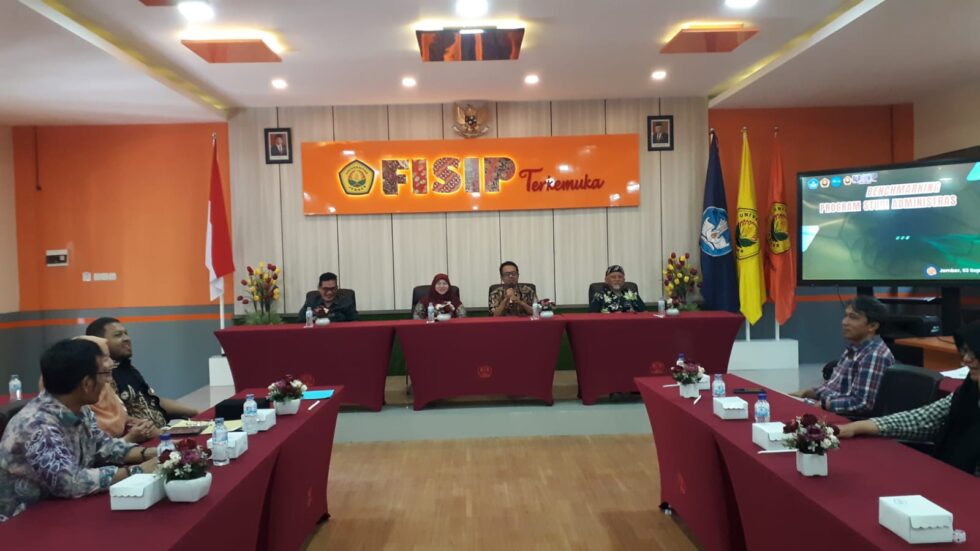Let’s translate the text into standard English:
Here’s a possible translation, taking into account the context and nuances of benchmarking in an academic setting:
“Benchmarking is a systematic process of comparing an organization’s products, services, or business practices with those of best-in-class organizations. Its primary goal is to identify opportunities for improvement and enhance overall performance.
In the Indonesian context, benchmarking can serve various purposes, such as:
Quality enhancement: Comparing product or service quality against international standards.
Operational efficiency: Identifying best practices to reduce costs and improve productivity.
Innovation: Discovering new and creative ideas from other organizations.
Customer satisfaction improvement: Comparing customer satisfaction levels with competitors.
On Tuesday, September 3, 2024, the Business Administration Study Program at Lambung Mangkurat University conducted a benchmarking visit to the Department of Business Administration, Faculty of Social and Political Sciences, University of Jember. Hosted in the International Room of the FISIP Universitas Jember, the delegation from the Business Administration Study Program, led by the Dean of FISIP Universitas Lambung Mangkurat, Prof. Dr. H. Budi Suryadi, S.Sos., M.Si., and the Coordinator of the Business Administration Study Program, Nurul Wahyuni, S.Sos., M.AB., was welcomed by the Dean of FISIP Universitas Jember, Dr. Djoko Poernomo, M.Si., CIQnR., CSBA., and the Vice Dean III, Dr. Edy Wahyudi, S.Sos., M.M., along with the Coordinator of the Department of Business Administration, Dr. Hari Karyadi, and all lecturers of the Department.
Several key points were discussed during the benchmarking visit:
Benchmarking Objectives
Identifying Strengths and Weaknesses: Understanding where each program excels and where improvements are needed.
Learning from the Best: Adopting best practices from other programs to enhance educational quality.
Determining Development Direction: Setting goals and strategies for future program development.
Aspects Compared
Curriculum:
Relevance to the Workplace: How relevant are courses to industry needs?
Curriculum Innovation: The existence of new courses or curriculum updates to keep pace with business developments.
Industry Involvement: How often are business practitioners involved in the learning process?
Availability of Elective Courses: The variety of elective courses offered.
Resources:
Faculty: Qualifications, experience, and number of faculty.
Facilities: Library, computer labs, classrooms, and other supporting facilities.
Budget: The amount of budget allocated to the study program.
Students:
Student Profile: Academic background, interests, and student motivation.
Student Achievement: Academic and non-academic achievements, and graduation rates.
Student Involvement: Level of student participation in academic and non-academic activities.
Research:
Research Productivity: Number of scientific publications, grants obtained, and research commercialization.
Research Relevance: How relevant research topics are to industry and community needs.
Research Collaboration: Cooperation with other institutions in conducting research.
Community Service:
Types of Service: Types of community service activities conducted.
Service Targets: The community groups targeted for service.
Impact of Service: The impact of community service activities on the community.
Cooperation:
Cooperation with Industry: Cooperation with companies for internships, joint projects, or curriculum development.
Cooperation with Other Institutions: Cooperation with other universities or government agencies.
International Cooperation: Cooperation with universities or institutions abroad.
Quality Assurance System:
Accreditation Process: The process and results of program accreditation.
Self-Evaluation: A mechanism for periodic self-evaluation.
Continuous Improvement: Efforts to continuously improve the quality of the study program.
Presentation Format
Introduction: Benchmarking objectives, brief profiles of both programs.
Discussion: Comparison of each predetermined aspect.
Conclusion and Recommendations: General conclusions from the benchmarking results and recommendations for improvement.

